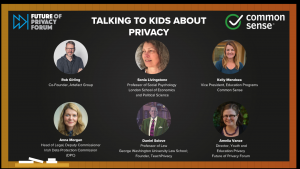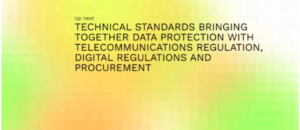Talking to Kids About Privacy: Advice from a Panel of International Experts
Now more than ever, as kids spend much of their lives online to learn, explore, play, and connect, it is essential to ensure their knowledge and understanding of online safety and privacy keeps pace. On May 13th, the Future of Privacy Forum and Common Sense assembled a panel of youth privacy experts from around the world for a webinar presentation on, “Talking to Kids about Privacy,” exploring both the importance of and approaches to talking to kids about privacy. Watch a recording of the webinar here.
The virtual discussion, moderated by FPF’s Amelia Vance and Jasmine Park, aimed to provide parents and educators with tools and resources to facilitate productive conversations with kids of all ages. The panelists were Rob Girling, Co-Founder of strategy and design firm Artefact, Sonia Livingstone, Professor of Social Psychology at the London School of Economics and Political Science (LSE), Kelly Mendoza, Vice President of Education Programs at Common Sense, Anna Morgan, Head of Legal and Deputy Commissioner of the Irish Data Protection Commission (DPC), and Daniel Solove, Professor of Law at George Washington University Law School and Founder of TeachPrivacy.
The first thing that parents and educators need to know? “Contrary to popular opinion, kids really care about their privacy in their personal lives, and especially now, in their digital lives,” shared panelist Sonia Livingstone. “When they understand how their data is being kept, shared, monetized and so forth, they are outraged.” To help inform youth, Livingstone curated an online toolkit with young people to answer frequently asked privacy questions that emerged from her research.
And a close second: their views about privacy are closely shaped by their environment. “How children understand privacy is in some ways colored by the part of the world they come from and the culture and ideas about family and ideas about institutions that they can trust, and especially how far the digital world has already become something they rely upon,” Livingstone added.
Kelly Mendoza encouraged audience members to start having conversations about privacy with kids at a young age, and to get beyond the common but too simple advice to not share personal information online. Common Sense’s Digital Citizenship Curriculum provides free lesson plans to address timely topics and prepare students to take ownership of their digital lives by grade and topic.
She also emphasized the important role that schools play in educating parents about privacy in her remarks. “It’s important that schools and educators and parents work together because really we’re finding that schools can play a really powerful role in educating parents,” Mendoza said. “Schools need to do a better job of communicating – what tools are they using? How are they rated and reviewed? What are the privacy risks? And why are they using this technology?” A useful starting point for schools and parents is Common Sense’s Family Engagement Resources Toolkit, which includes tips, activities, and other resources.
Several panelists emphasized the critical role schools play in educating students about privacy. To do so effectively, schools engage and educate teachers to ensure they are informed and equipped to have meaningful conversations about privacy with their students.
Anna Morgan provided a model for engaging children in informing data protection policies through classroom-based lesson plans. Recognizing that the General Data Protection Regulation (GDPR) and Data Protection Law are complex, the DPC provided teachers with a quick start guide to provide background knowledge, enabling them to engage in discussions with children about their data protection rights and entitlements.
Privacy can be a difficult concept to explain, and there’s nothing quite like a creative demonstration to bring privacy concerns to life. One example: the DPC created a fictitious app to solicit children’s reactions to the use of their personal data. Through their consultation, Morgan shared that 60 percent of the children surveyed believed that their personal data should not be used to serve them with targeted advertising, finding it scary and creepy to have ads following them around. A full report from the consultation can be found here.
Daniel Solove also highlighted the need for educational systems to teach privacy. “Children today are growing up in a world where massive quantities of personal information are being gathered from them. They’re growing up in a world where they’re more under surveillance than any other generation. There’s more information about them online than any other generation. And the ability for them to put information online and get it out to the world is also unprecedented,” Solove noted. “So I think it’s very important that they learn about these things, and as a first step, they need to appreciate and understand the value of privacy and why it matters.”
One way for kids to learn about privacy is through storytelling. Solove recently authored a new children’s book about privacy titled, THE EYEMONGER, and shared his motivations for writing the book with the audience. “There really wasn’t anything out there that explained to children what privacy was, why we should care about it, or really any of the issues that are involved in this space, so that prompted me to try to do something about it.” He also compiled a list of resources to accompany the book and help educators and parents teach privacy to their children.
Building on the thread of creating outside-the-box interactive experiences to help kids understand privacy, Rob Girling shared with the audience a game called The Most Likely Machine, developed by Artefact Group to help preteens understand algorithms. Girling saw a need to teach algorithmic literacy given the impact on children’s lives, from determining college and job applications to search engine results. For Girling, “It’s just starting to introduce the idea that underneath algorithms are human biases and data that is often biased. That’s the key learning we want kids to take away.”
Each of the panelists shared a number of terrific resources and recommendations for parents and educators, which we have listed and linked to below, along with a few of our own.
Watch the webinar in full here, and we hope you will use and share some of the excellent resources referenced below.
Rob’s Recommended Resources
- The Most Likely Machine Game and The Most Likely Machine case study, which has some background on design decisions that informed the experience.
- The Tarot Cards of Tech, a free, downloadable card deck to prompt conversations around the impact of technology products.
- The Ethical Explorer Pack, a toolkit to help those working in technology advocate for more ethical products.
Sonia’s Recommended Resources
Kelly’s Recommended Resources
- Digital Citizenship Curriculum
- Protecting Student Privacy on Social Media Infographic
- Online Privacy Toolkit: Family Engagement Resources
Anna’s Recommended Resources
Dan’s Recommended Resources
- THE EYEMONGER, Daniel Solove’s children’s book about privacy
- Privacy Resources for Educators and Parents by Daniel Solove to accompany THE EYEMONGER to help educators and parents teach privacy to children
Additional Future of Privacy Forum Resources of note:
- Youth Privacy and Data Protection 101 Infographic
- Protecting Children Online: Privacy by Design Approaches, an International Association of Privacy Professionals (IAPP) Global Summit keynote panel discussion featuring Amelia Vance.
- Student Privacy Communications Toolkit: For Schools and Districts



